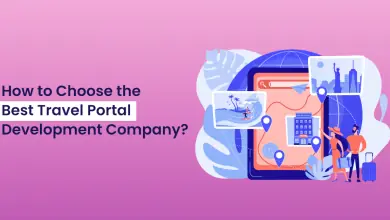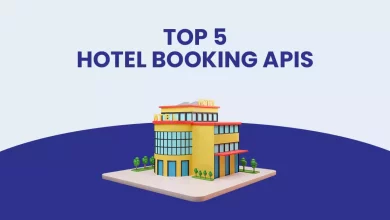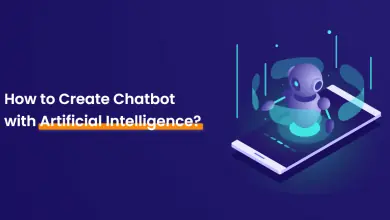Popular AI Chatbot Comparison : Which One Fits for Your Travel Website
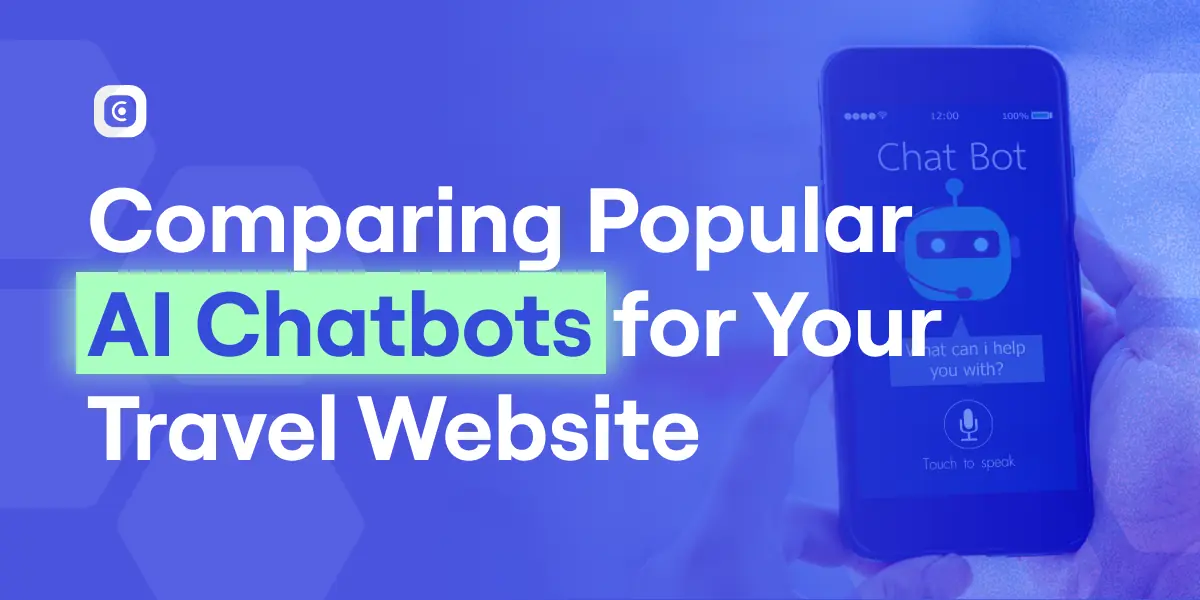
It’s not uncommon for users to heavily rely on AI chatbots for their day-to-day uses, like creating a travel itinerary, a checklist of activities for a specific destination, or even the best available flights and stay options. But what if your travel website could offer the same services right from the home page? Chin up, as this has now become a reality.
AI-powered chatbots are changing in the way people book and plan travel. Travelers are able to get immediate answers, customized recommendations, and continuous support from such virtual travel assistants via leveraging machine learning and natural language processing.
AI chatbots are currently popular on leading travel sites such as Expedia and Booking.com for users for the purpose of trip planning and deal finding. In this guide, AI travel chatbots are defined, as well as their benefits are explored. In this guide, it is outlined how you can choose the AI travel chatbot that is right for your travel website, and a comparison of top solutions.
What Are AI Travel Chatbots?
Grasping their exact meaning is vital for properly understanding AI chatbots’ importance within travel website development. An AI travel chatbot exists as more of a virtual assistant within your own website or app and uses artificial intelligence, natural language processing (NLP), and machine learning for the simulation of human travel conversations.
It can answer booking questions, suggest flights or hotels, and handle itinerary changes. Unlike traditional chat widgets, AI chatbots actually learn from data and mimic real conversations. From making trip planning to providing intuitive they can access to airline, hotel, and reservation APIs to provide live information in chat.
Why Use AI Chatbots on Your Travel Site?
Below are a few reasons why AI chatbots are now becoming an integral part of travel booking engines.
- 24/7 Availability: Chatbots never sleep. They provide instant answers and booking assistance day or night. Travelers get immediate help with flight updates or hotel bookings without waiting for an agent.
- Personalized Recommendations: AI bots tailor suggestions to user preferences and history. For example, a chatbot can recommend local attractions or special deals based on the traveler’s interests.
- Faster Planning & Booking: Instead of hopping between multiple sites, users can compare flights, hotels, and activities in one chat. AI bots streamline searches and handle bookings directly in the conversation.
- Cost Savings: By automating routine queries and comparing live prices, chatbots help travelers get the best deals while reducing a business’s support costs. They can pre-screen answers and handle FAQs, letting agents focus on complex issues.
- Multilingual Support: Top travel chatbots can converse in dozens of languages, removing language barriers for global travelers. They can even detect language preferences and switch automatically.
Who Benefits from AI Travel Chatbots?
Both travelers and travel businesses gain from AI chatbots. Individuals enjoy a virtual travel assistant 24/7, while companies boost engagement and cut support costs by automating routine tasks. Additionally, AI chatbots appeal the most to:
- Individual Travelers
- Travel Agencies & Tour Operators
- Hotels & Airlines
- B2B and B2C Businesses
- Online Travel Agents
- Corporate Travel Manager
Key Features to Look For in a Chatbot for Travel Agency
When evaluating chatbots for travel, ensure they offer the capabilities needed to serve travelers effectively:
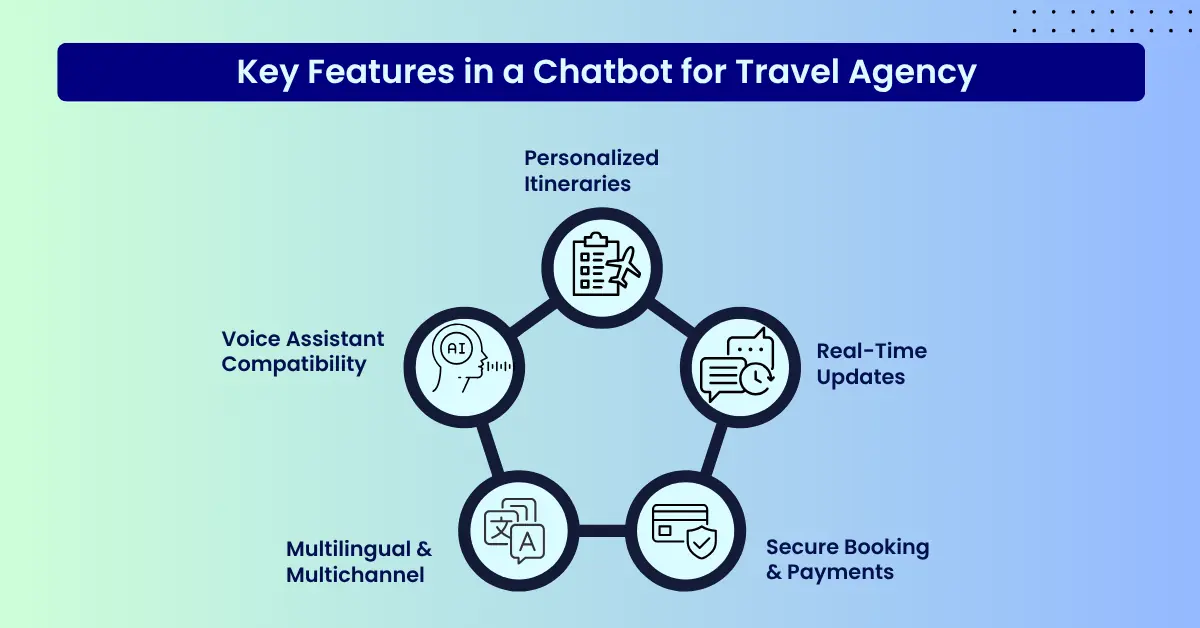
Personalized Itineraries
One of the most crucial responsibilities of a chatbot is to help customers make travel plans seamlessly. The same should be justified by your AI travel chatbot as well. It should be trained to access all the user’s preferences, past booking data, and budget considerations to provide a plan that’s just perfect. Additionally, users should be able to change it as desired.
Real-Time Updates
What good is a travel booking solution if it does not provide a real-time solution? It’s a basic necessity of a portal and remains the same for an AI chatbot as well. Whether it’s flight delays, gate changes, weather alerts, or booking confirmations, the integrated bot should be able to provide real-time updates via push notifications or emails.
Secure Booking & Payments
Money is the dearest to us all, so why not ensure its safety for your travel booking engine as well? The integrated AI chatbot should provide secure payment gateways for users to make payments without leaving a digital trail for scammers.
Multilingual & Multichannel
It’s better to plan a step ahead with proper planning when it comes to developing a travel booking website. By opting for travel bots that can converse in multiple languages and can be easily deployed on apps or messaging platforms, you’re making your job easy when it’s time to scale.
Voice Assistant Compatibility
Some bots extend to voice assistants such as Alexa and Google Assistant. And the best part is you can optimize your booking solution with the ability to be controlled without even touching the screen. Voice-enabled travel bots can book or check details via spoken commands for hands-free convenience.

Top 10 AI Chatbots for Travel Websites
Now that you’re well-versed with the relevance of AI travel chatbots for a travel portal, let’s quickly go through some of the most popular AI chatbot solutions, with a focus on seamless functionality:
1. ChatBot (ChatBot.com)
If you’re looking for a no-code builder that can seamlessly tap into your company resources, such as website history, interactions, active users, and knowledge base, this is a great option to consider. ChatBot is highly customizable and excels at handling customer journeys. However, it requires some technical expertise for seamless company data configuration.
2. Botsonic (Writesonic)
Writesonic has also provided a no-code chatbot builder powered by GPT-4. With Botsonic, travel companies can design the perfect chatbot using drag-and-drop tools, unique branding, and FAQ integration. With features like multi-language support and easy API connections, it does make a strong presence. However, there are no free trials available with this one.
3. Zendesk AI Chat
Travel companies are looking for an enterprise-grade chatbot that provides 24/7 support by understanding customer intent and routing queries to agents when needed. Zendesk is simply perfect. It’s already trained on vast amounts of data and can seamlessly answer traveler FAQs with maximum accuracy.
4. Verloop.io
To provide a consistent and conversational experience to your customers from the chatbot, prefer Verloop.io. Verloop’s drag-and-drop builder allows creating multilingual bots that can engage via website chat, WhatsApp, or Facebook. It is suitable for travel businesses that want a persistent assistant across channels.
5. Yellow.ai
This AI chatbot for travel websites is popular for supporting more than 150+ languages to users with multiple templates to choose from. What’s more, businesses can deploy the chatbot seamlessly on mobile apps and travel booking software as well. It’s geared for enterprises looking for features like automated workflows and generative AI suggestions.
6. Freshchat (Freshworks)
This is yet another chatbot that can effectively analyze the user behaviour to provide the best possible results that match the intent of the users. Powered by well-trained NLP measures, Freshchat bots can handle traveler queries on the website or social channels. There’s even a quick dashboard to analyze traveler behavior and agent performance.
7. Flow XO
Let your customers access the AI chatbot without any limitations with Flow XO. This is also a no-code chatbot builder that provides a user-friendly interface for all travelers. When it comes to features, customers will be enriched with the ability to pay within the chats, get access to attached maps or links in conversation, and much more.
8. Engati
Get access to more than 50 languages with Engati with quick web deployments and the ability to add builders as desired with a simple drag and drop. It’s good for basic travel Q&A and booking flows. So if you’re primarily focusing on guiding users through the FAQs, this chatbot can be a great addition to your travel website.
9. ChatGPT/OpenAI (Custom)
If nothing has appealed to you so far, it’s time to go custom. With ChatGPT integration to your travel website, you can get open-ended assistance with the power of AI. It allows companies to create a virtual agent that not only provides real-time information but also helps with planning. However, ChatGPT may need tuning and external plugins to access live booking data, making it more of a custom solution.
10. Specialized Travel Bots
Lastly, there’s even an option to opt for dedicated travel assistants that exist on major booking sites. Such chatbots are very good in handling search and booking services with conversational queries. Simply put, you’re customers would be able to book the next available flight To Denmark by just asking the chatbot.

How to Choose the Right AI Chatbot
Now there’s another factor to consider when it comes to AI in the travel industry. What is the right process to choose the best chatbot? Actually, there’s a step-by-step process if followers help you find the right provider with the best outcomes.
Define Your Goals
Take time to craft an actionable strategy by studying your goals and considering all the probabilities. You must choose from FAQ assistance, booking assistance, or driving sales. This will help you find a chatbot that aligns with your primary goal. For example, if 90% of queries are booking changes, pick a chatbot with strong travel API integration.
Consider Content & Data
There’s no denying the fact that data rules above all. So ensure that your chatbot is able to access real-time data while seamlessly blending with GDS APIs like Amadeus, Sabre, Galileo, etc. This is very crucial if you want to provide real-time booking features to your customers with instant confirmations.
Ease of Implementation
Nobody wants to choose an AI chatbot that just hard to deal with. Take this factor into consideration properly, as it will be playing a crucial role during the scaling of the platform. Opt for no-code or low-code builders who are perfect for non-developers and can be launched without much hassle.
Language & Channel Support
It goes without saying that to provide for your international customers, you’ll require a chatbot that understands multiple languages. While you’re at it, also select the AI chatbots that can be easily integrated into apps or software if required. The best chatbots can be embedded with one click across channels.
Customization & Persona
Reflecting your brand persona is a very important step as it helps in building customer trust and improving the exposure. Choose a chatbot you can brand with your style and tone. Some bots allow a persona like friendly or formal. Ensure you can tailor responses and prompts to match your brand voice.
Security & Compliance
Security is yet another factor that should not be overlooked. Hence, it’s very important to ensure that your travel AI chatbot is compliant with industry regulations such as HIPAA, CCPA, GDPR, PCI-DSS, etc. Many bots, for example, let you collect payments via trusted gateways, and it’s a great way to earn customer trust.
Unique Insights for Your Travel Site
Here’s how you can get actionable insights for your travel website and make necessary adjustments without having to start from scratch for the best possible results.
AI vs. Human Balance
You know those debates about AI taking over human jobs, yeah, that’s still very far from happening. Hence, you need to realize that AI is just a medium to streamline solutions; it’s not the ultimate solution to all your problems. Make a plan for human fallback that complex cases or frustrated users can be seamlessly transferred to a live agent.
Data Quality
The chatbot’s intelligence is only as good as its data. Keep your FAQs, pricing data, and availability feeds up to date. As a result, use seasonal destinations and new deals to regularly train your chatbot on new information. This will help you to equip your customers with nothing but the best.
Measuring Success
By tracking metrics such as booking conversions, customer satisfaction scores (CSAT), deflection of support calls, and engagement rates, you can monitor the effectiveness of all your campaigns. It’s essential to make the most effective strategies. For example, if chatbots answer 60% of queries successfully, your human agents can focus on the remaining 40% of complex cases.
Future Trends
Keep an eye on advancements like more natural voice assistants and deeper personalization. Soon, chatbots may analyze calendars or preferences autonomously to suggest trips. Stay informed about new AI releases like ChatGPT plugins or travel AI startups to keep your chatbot cutting-edge.

Embrace Your AI Travel Companion
The AI revolution is at its peak, and any travel company that does not adapt to the latest trends will definitely be left behind. So don’t let your business lose the edge and transform it’s capabilities with AI travel itineraries that can boost customer satisfaction and revenue. Whether you’re a small tour operator or a global booking platform, the right AI assistant will help your customers travel more easily and faster.
FAQs
Most chatbot platforms connect via APIs or webhooks to your existing travel systems, such as flight reservation APIs, hotel CRSs, car rental platforms, etc. For example, a chatbot can call Amadeus or Sabre APIs to fetch real-time flight schedules.
General AI chatbots (e.g. ChatGPT) are trained on broad knowledge and excel at open-ended conversation. Specialized travel bots are built on specific travel data and often integrate directly with booking systems.
Travel chatbots should follow the same data protection standards as any digital service. Reputable platforms use encrypted connections and allow anonymizing or deleting user data.
Yes, advanced travel chatbots can process cancellations or modifications if they’re integrated with booking systems. They’ll follow your business rules, like refund policies, when a user requests a change.
Key metrics include first-contact resolution rate (did the bot fully answer questions?), booking conversion rate through the bot, customer satisfaction scores after chatbot interactions, and reduction in live support tickets.


